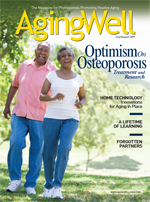July/August 2009 Eating for Longevity Eighty-five-year-old David H. Murdock’s energy level is akin to a man half his age—or younger. He’s up at sunrise and does an hour of cardio and 50 push-ups before heading to the office, where he puts in a full day as chairman and owner of the Dole Food Company, Inc, the world’s largest producer and marketer of fresh fruits and vegetables. No, Murdock didn’t drink from the Fountain of Youth. But he has discovered a formula for healthy aging and longevity that’s based on a diet rich in fresh produce, whole grains, and protein sources such as fish, beans, and nuts. “Aging is a normal process,” says Nicholas D. Gillitt, PhD, nutrition research and labeling manager at the Dole Nutrition Institute in Westlake Village, CA. “You can’t prevent it, but you can slow it down, and that’s where diet comes in.” Research on fruits and vegetables, the effects of calorie restriction, and the diets of people in cultures known for their longevity all provide clues about how to eat to live longer and more healthfully. The Garden of Youth Phytonutrients give fruits and vegetables their color and flavor. For example, the red in tomatoes comes from a phytonutrient called lycopene. Likewise, the sulfurlike flavor and aroma of broccoli is due to the presence of the phytonutrient sulforaphane. Environmental factors such as exposure to sunlight and cigarette smoking, as well as substances called free radicals that can arise out of simple metabolic processes such as breathing, can cause what we see as aging-related changes—graying hair, wrinkled skin, and brittle bones. Researchers are finding that many of the phytonutrients in fruits and vegetables can both protect against and repair damage to the body’s cells. “Onions and apples are rich in quercetin, an antioxidant that may be even more powerful than vitamin C in preserving brain cells,” Murdock says. “The anthocyanins found in grapes, berries, and cherries also may help preserve memory. Spinach, romaine, and other leafy greens contain antioxidants like lutein, which fight age-related macular degeneration, the leading cause of blindness in those over 60. “Of course, as we age, it’s important to eat foods that support bone health,” he continues. “Take broccoli, for example. It provides 175% of your vitamin K needs, plus vitamin C, folate, magnesium, and potassium, all of which promote strong bones, thereby reducing risk of fracture, which can rob the older population of independence.” More is better when it comes to eating fruits and vegetables. Rush University researchers who collected dietary data from 3,718 adults aged 65 and older and administered memory tests over the course of six years found that those who ate more than 2 cups of vegetables daily had a 38% decrease in the rate of mental deterioration compared with those who ate less than 1/2 cup of vegetables per day. What fruits and vegetables are best? “Since there are hundreds and thousands of phytonutrients in various plant foods, it’s important to eat a variety on a daily basis,” says Gillitt. Calorie Restriction Calorie needs vary widely based on an individual’s height, weight, age, and level of physical activity. For example, a 20-year-old athletic man may require 3,000 to 4,000 calories per day, while a sedentary 70-year-old woman may need only 1,500 calories per day. So how many calories are required for a potential life-extending benefit? According to the World Cancer Research Fund/American Institute for Cancer Research 2007 Report “Food, Nutrition, Physical Activity, and the Prevention of Cancer: a Global Perspective,” it’s the amount that would promote someone being as thin as possible without being underweight. “This would be equal to a BMI [body mass index] of 19 or 20,” says Gillitt. BMI is a calculation of weight in relation to height. To decrease calorie intake healthfully, it’s important to fill up with nutrient-dense foods, yet another reason to eat more fruits and vegetables. Clues From Other Cultures The healthful and life-enhancing benefits of the Mediterranean diet became clear last year when a study published in BMJ revealed that adherence to the diet is associated with a significant improvement in health status, as seen by a reduction in overall mortality (9%), mortality from cardiovascular diseases (9%), incidence of or mortality from cancer (6%), and incidence of Parkinson’s disease and Alzheimer’s disease (13%). Sara Baer-Sinnott, executive vice president of Boston-based Oldways, says, “Research has shown that key features of this diet appear to be transplantable to other dietary cultures and cuisines and may have a substantially beneficial impact on the general mortality of older people who have Westernized dietary habits.” The key, she adds, “is that it is the total diet that is particularly important, not just one ingredient. This can be as simple as cooking whole wheat or whole grain pasta, tossing in a couple of frozen shrimp and vegetables like snow peas sautéed in olive oil, and serving this entrée with a salad on the side. It’s a fast, simple dinner you can put on the table in under 15 to 20 minutes. The beauty of the Mediterranean diet is its simplicity.” Likewise, research on the diet of people living in Okinawa has shown a longevity element. For example, health statistics show Okinawans have the longest documented life expectancy on the planet at 85.1 years for women and 77.2 years for men. Centenarians in Okinawa number about 35 per 100,000 people compared with five to 10 among the same population in the United States. Bottom Line — Carol M. Bareuther, RD, is a St. Thomas, U.S. Virgin Islands-based writer who contributes to a variety of regional, national, and international publications. |

